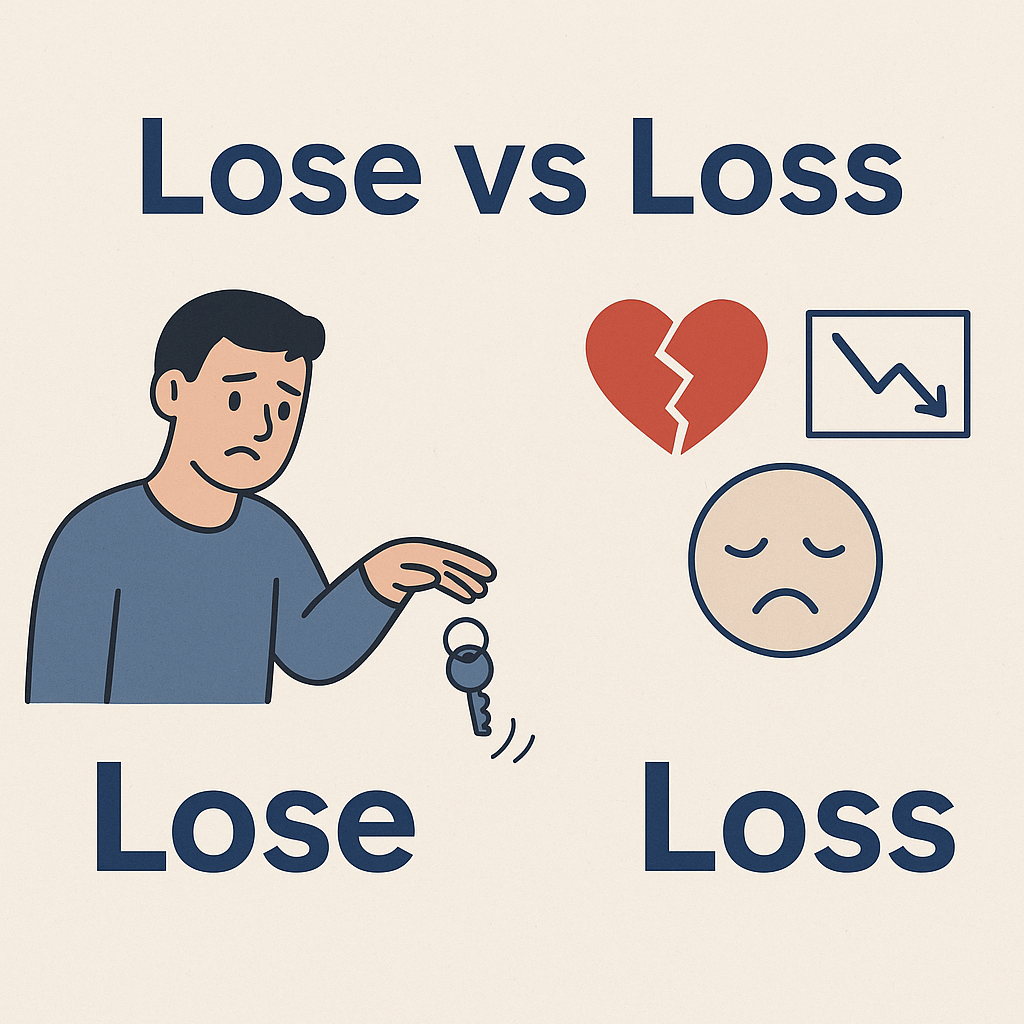Lose vs Loss

The words lose vs loss often trip people up, especially in writing. While they both relate to the concept of not having something anymore, they function differently in a sentence. Misusing them can make even simple messages sound confusing or incorrect.
So, what’s the difference between lose vs loss?
- “Lose” is a verb that refers to the act of no longer having something.
- “Loss” is a noun that refers to the state or fact of having lost something.
Although similar in meaning, they play different grammatical roles. In this article, we’ll break down the grammar, share real-life examples, point out common mistakes, and give you memory tips to help you clearly understand lose vs loss.
Grammatical Explanation
Let’s explore the grammar behind lose vs loss:
- Lose is a verb (present tense):
It means to misplace, be defeated, or stop having something.
Example: I always lose my keys.
She doesn’t want to lose the game. - Loss is a noun:
It represents the fact or feeling of losing something.
Example: The team suffered a heavy loss.
He spoke about the loss of his father.
So, in short:
- You lose something (action).
- You experience a loss (result).
When comparing lose vs loss, remember that “lose” is something you do, while “loss” is something you experience.
Real-Life Examples
Lose (verb):
- Be careful not to lose your phone.
- They might lose their spot in the tournament.
- If we don’t act now, we could lose everything.
Loss (noun):
- He grieved over the loss of his pet.
- Their loss in the finals was unexpected.
- The company reported a financial loss this quarter.
Incorrect usage:
- She loss her purse yesterday.
She lost her purse yesterday. (past tense of “lose”) - He took the lose very hard.
He took the loss very hard.
Seeing these examples in action will help solidify your understanding of lose vs loss and how to apply them properly in different contexts.
Common Mistakes
One of the most common errors with lose vs loss is treating them as interchangeable—which they’re not.
- Don’t let your team suffer another lose.
Don’t let your team suffer another loss. - They might loss the contract.
They might lose the contract.
Writers also confuse the spelling:
- “Loose” (with two o’s) is a completely different word meaning “not tight.”
Example: My shoelaces are loose.
Be careful not to mix up “lose,” “loss,” and “loose.” Focus on what role the word is playing in your sentence action (lose) or result (loss).
Memory Tips
Here’s how to remember the difference between lose vs loss:
- Lose = Verb
“Lose” rhymes with “choose” both are actions.
Example: You can choose to win or lose. - Loss = Noun
Think of “loss” as the aftermath of losing.
Example: The loss of the championship hurt.
Mnemonic trick:
- If you “do” it, it’s lose.
- If you “have” it, it’s a loss.
Also, remember: “Lose” has one ‘o’, not two. If you double the “o,” you’ll end up with “loose”—a different word entirely.
By remembering these simple cues, you can easily separate lose vs loss in your writing.
Conclusion
In summary, the difference between lose vs loss comes down to grammar. Use “lose” when referring to an action, and “loss” when describing the outcome or result. Avoid spelling errors and think about the sentence structure to choose the right word every time.
Want to master more confusing pairs? Check out our article on Break vs Brake for another helpful breakdown.
Still unsure? Read Cambridge Dictionary’s entry on lose for further clarity.